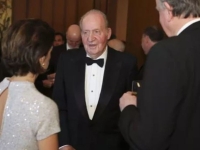News
British Justice recognizes the immunity of King emeritus Juan Carlos I
Until the moment of his abdication
USPA NEWS -
The London Court that is studying the lawsuit filed by the aristocrat Corinna Larsen against the emeritus King of Spain, Juan Carlos I de Borbón, for harassment has issued a resolution in favor of the monarch in the allegation that he made about the immunity of his person. "The alleged conduct prior to the abdication is immune from the jurisdiction of the courts of this country," considers the British Court of Appeal, in its civil division, which has recognized the appeal presented by the emeritus King's lawyers, alleging that their actions between 2012 and June 18, 2014 do not belong to the "private sphere."
After this pronouncement, Juan Carlos I can only be tried in London for harassment of Corinna on the dates after his abdication. The aristocrat Corinna Larsen, a former friend of the monarch, maintains that the maneuvers against her have lasted "from 2012 to the present." For this reason, Corinna claims financial compensation the amount of which she has not yet specified. The two most serious alleged episodes that supported her claim are out of possible legal claims, after the decision of the British Court. It is about the alleged visit of the former head of the Spanish National Intelligence Center (CNI in its Spanish acronym), Félix Sanz Roldán, to London with the intention of "putting pressure" on her, according to Larsen's version, and the alleged entry of a team of agents at her home in Monaco.
Corinna Larsen's defense stressed that the immunity granted to the emeritus King by the London Court of Appeal only "affects a very limited matter." In a statement, Michael Kim, from the law firm Kobre & Kim, welcomed the fact that the lawsuit "can now progress towards a trial in the High Court of London," and recalled that "the majority of the lawsuit, as of 2014, is unaffected and should go to trial." In his opinion, his client's lawsuit entails "very serious allegations of harassment that went on for a long time, and that will be examined in detail when the trial takes place."
The Court ruling does not affect the possibility of holding a trial, but limits the acts attributable to what happened after the abdication. In her lawsuit, Corinna insists that "the pattern of harassment" dated back to 2012 and lasted beyond the time when Juan Carlos I lost his constitutional privilege with his resignation.
On November 8, the lawyers for Juan Carlos I defended before the London Court of Appeal the appeal filed by the emeritus King in response to the harassment complaint filed by Corinna Larsen. In the session, three magistrates heard the arguments of the defenders of Juan Carlos I asking for his exoneration for the charges that occurred between April 2012 and June 2014, when he was still head of State. The emeritus King's lawyers presented their arguments against a previous ruling by the London High Court that denied immunity on the grounds that the alleged harassment occurred in the private sphere, since Juan Carlos I now only has an honorary title.
Larsen's defenders intervened in the second part of the hearing and argued that Juan Carlos I would only be protected by "immunity" in the event that his actions had an "official" interest, while the facts denounced by his client "did not they were not part of a state operation but of a covert and personal campaign."
The legal proceedings date back to 2020, when Corinna Larsen filed a lawsuit against the emeritus King in which she accused him of having launched a harassment and espionage operation that began, according to her account, in 2012. According to her account, the Spanish Secrets Services deployed an operation with the aim of returning to Juan Carlos I the 65 million that he had transferred from his hidden accounts in Switzerland. Likewise, she argues that the CNI launched an espionage operation in which she was threatened and that it sought to seize the documentation in its possession on the offshore companies of Juan Carlos I.
Liability for this article lies with the author, who also holds the copyright. Editorial content from USPA may be quoted on other websites as long as the quote comprises no more than 5% of the entire text, is marked as such and the source is named (via hyperlink).






